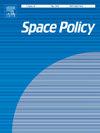Sustainability as a core principle of space and planetary exploration
IF 1.9
4区 社会学
Q2 INTERNATIONAL RELATIONS
引用次数: 0
Abstract
Human Society has renewed interest in exploration and settlement of the Moon, demonstrated by NASA's active Artemis program, privatization of United States' lunar exploration through Commercial Lunar Payload Services (CLPS), and China's planned International Lunar Research Station (ILRS). Plans extend beyond just the Moon, driven by NASA's establishment of the Moon to Mars Program, developments in In-Situ Resource Utilization (ISRU) for crewed exploration, and commercial interests in asteroid resources. As we enter a new era of large-scale space exploration, both public and private for the first time, the environments of the Moon and Mars are at risk of being irreversibly altered by human activity. We propose that sustainability should be laid at the foundation of the next generation of human space exploration. To this end, existing planetary protection policies must be expanded to include requirements for protecting the Lunar and Martian environments beyond biological contamination, and guidelines founded on space sustainability should be expanded to include issues beyond orbital debris, crowding, and security. Existing and improved policies should adopt compliance incentives. This shift in policy is not only crucial for the long-term success of upcoming programs, but, if implemented, can foreseeably lead to positive developments on Earth.
可持续性是空间和行星探索的核心原则
人类社会重新燃起了对月球探索和定居的兴趣,美国国家航空航天局(NASA)积极开展的阿尔忒弥斯计划(Artemis program)、通过商业月球有效载荷服务(CLPS)实现美国月球探测私有化以及中国计划中的国际月球研究站(ILRS)都证明了这一点。在美国国家航空航天局(NASA)建立的月球到火星计划(Moon to Mars Program)、用于载人探索的原位资源利用(ISRU)的发展以及对小行星资源的商业兴趣的推动下,计划不仅仅局限于月球。随着我们首次进入大规模太空探索的新时代,无论是公共的还是私人的,月球和火星的环境都面临着被人类活动不可逆转地改变的风险。我们建议将可持续性作为下一代人类空间探索的基础。为此,必须扩大现有的行星保护政策,以包括保护月球和火星环境的要求,而不是生物污染,并应扩大以空间可持续性为基础的准则,以包括轨道碎片、拥挤和安全以外的问题。现有和改进后的政策应采用遵从性激励措施。这种政策的转变不仅对即将实施的项目的长期成功至关重要,而且如果得到实施,可以预见会给地球带来积极的发展。
本文章由计算机程序翻译,如有差异,请以英文原文为准。
求助全文
约1分钟内获得全文
求助全文
来源期刊

Space Policy
Multiple-
CiteScore
3.40
自引率
36.40%
发文量
40
期刊介绍:
Space Policy is an international, interdisciplinary journal which draws on the fields of international relations, economics, history, aerospace studies, security studies, development studies, political science and ethics to provide discussion and analysis of space activities in their political, economic, industrial, legal, cultural and social contexts. Alongside full-length papers, which are subject to a double-blind peer review system, the journal publishes opinion pieces, case studies and short reports and, in so doing, it aims to provide a forum for the exchange of ideas and opinions and a means by which authors can alert policy makers and international organizations to their views. Space Policy is also a journal of record, reproducing, in whole or part, official documents such as treaties, space agency plans or government reports relevant to the space community. Views expressed in the journal are not necessarily those of the editors or members of the editorial board.
 求助内容:
求助内容: 应助结果提醒方式:
应助结果提醒方式:


